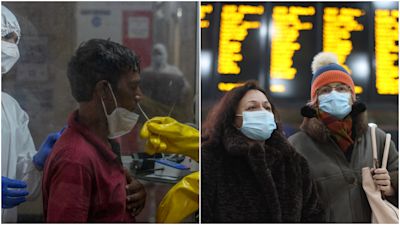What is the Arcturus Covid variant causing cases to surge in India?

A new Covid subvariant responsible for a huge surge in infections in India has driven health officials to reintroduce mandatory mask wearing and begin mock testing drills.
Two Indian states, Haryana and Kerala, have reintroduced mask wearing in public due to 'Arcturus', an Omicron subvariant that has prompted the biggest rise in weekly cases in seven months.
The World Health Organisation (WHO) has warned that 'Arcturus' or XBB.1.16 as it clinically referred to, is spreading across India.
The country is asking states to identify emergency hotspots and increase testing.
In contrast, the Office of National Statistics has said testing in the UK has reached its lowest point since peaking in December 2021.
India's Ministry of Health recorded more than 3,000 new cases in a single day and 40,215 active Covid infection across the country on April 12.
First detected back in January, the new strain is currently being monitored by WHO, which has noted some mutations are of concern.
Is it more transmissible?
In short, yes.
Experts believe this new variant has the potential to be more transmissible than previous Omicron subvariants, including 'the Kraken' which caused a rapid increase in US Covid cases earlier this year.
Dr Maria Van Kerkhove, the WHO's Covid technical lead, said: “It's been in circulation for a few months.
"It has one additional mutation in the spike protein which in lab studies shows increased infectivity as well as potential increased pathogenicity."
Dr Van Kerkhove added that while XBB.1.16 had been detected in other countries most sequences were from India where it had replaced other variants.
Are cases of 'Arcturus' more severe?
Dr Van Kerkhove said: "We haven’t seen a change in severity in individuals or in populations but that’s why we have these systems in place, systems to track the variants, global collaborations to assess transmissibility, immune escape, severity and the impact of any of our interventions including diagnostics, therapeutics and vaccines.
"So, we have to remain vigilant, and we will continue to work with our Member States as we transition all of the pillars of the response because everything that we are doing for Covid-19 is pandemic preparedness for the future."
How has covid affected India?
WHO estimates there were 4.7 million deaths attributed to Covid by the end of 2021 in India, more than any other country in the world.
The majority of which came from a devastating wave of the Delta variant back in March 2021.
A return to mask wearing in several states, the first time since March 2022, has led to understandable concern.
However, India's Health Minister, Dr Mansukh Mandaviya said there is "no need to worry".
He said: “Currently, the sub-variant of omicron, which is circulating in the country, hasn’t led to an increase in the rate of hospitalisation.”
Are there any new symptoms?
Symptoms remain the same as other variants, including shortness of breath and a cough.
However, some infected individuals are reporting conjunctivitis and sticky eyes.
Want a quick and expert briefing on the biggest news stories? Listen to our latest podcasts to find out What You Need To Know.
Could the subvariant make its way to the UK?
As of April 11, there have been 66 confirmed cases of Arcturus detected in the UK.
Dr Philip Anyanwu, Associate Professor of Public Health at Warwick University said: "Based on the information we have I don’t think we should instigate public panic”.
Dr Anyanwu identified that "seasonally we are at an advantage because we have just passed winter which is the most crucial time for the pandemic".
He explained to ITV News "the UK’s significant risk of passenger movement with India", pointing out that "it might take subsequent weeks to see what is actually happening with the spread of the Arcturus variant".
Dr Anyanwu added: "The UK should be proactive and not reactive to the new variant and not wait to respond until the number of Covid-19 cases become overwhelming."
A UK Health Security Agency spokesman said: "It is not unexpected to see new variants of SARS-CoV-2 emerge. UKHSA continues to analyse all available data relating to SARS-CoV-2 variants in the UK and abroad and is monitoring the situation closely.
"Vaccination remains our best defence against future Covid-19 waves, so it is still as important as ever that people come take up all the doses for which they are eligible as soon as possible."
Currently, the World Health Organisation is advising that while the variant can replace other Covid strands and has been detected in other countries, the majority of cases have been detected in India.